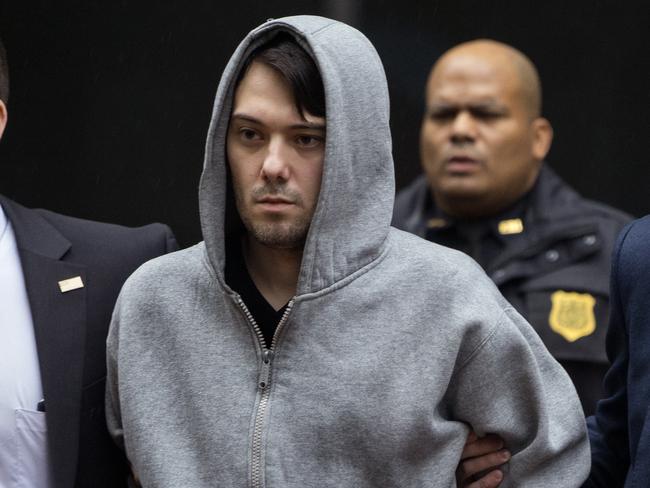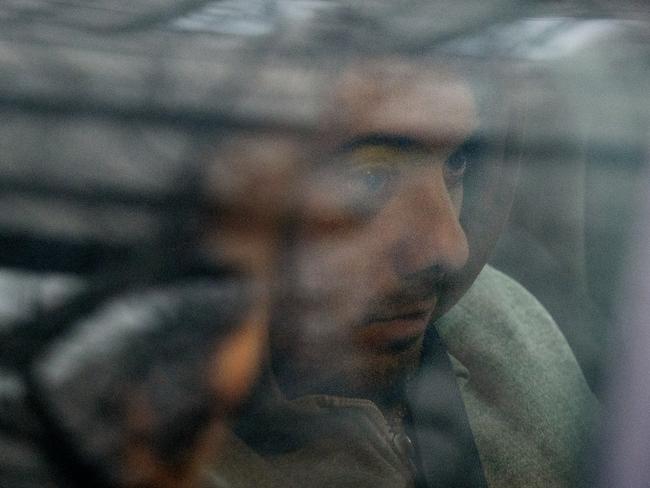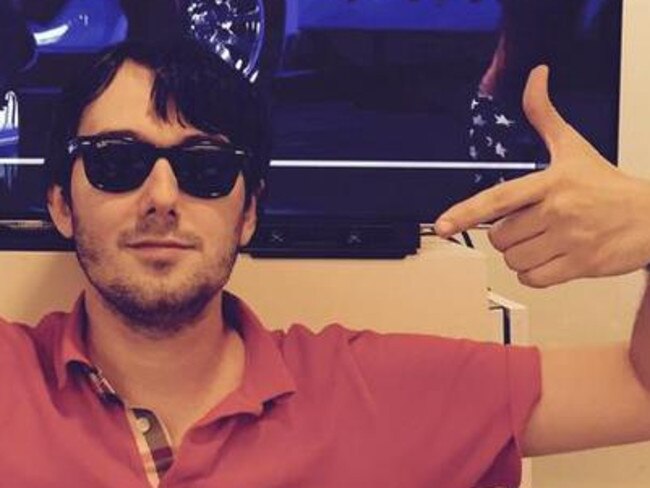Turing CEO Martin Shkreli courted attention and now he has it
MARTIN Shkreli should’ve laid low when he became the US’ “most hated man”. He only got worse, and now he has paid the price.
YOU might think being anointed “America’s most hated man” might be cause to step back from the spotlight and avoid any further controversy, but not Martin Shkreli.
When news spread that the 32-year-old pharmaceuticals CEO had been caught hiking up the cost of a lifesaving HIV drug by an inexplicable 5000 per cent back in September, Shkreli didn’t panic. Instead, he went on the offensive, taunting his critics, putting in smug TV appearances, live-streaming his work day and even buying a $US2 million, one-of-a-kind rap album.
Worse still, as the mayhem swirled and the headlines got progressively worse, he appeared to enjoy it.
But Shkreli’s familiar grin was nowhere to be seen this morning, as he was marched across a New York footpath and into a waiting police car, handcuffed and hooded and accused of a “securities fraud trifecta of lies, deceit and greed”.

It now appears the Turing Pharaceuticals CEO may be paying the price for all that attention.
Shkreli denies allegations he cheated investors out of $US11 million and used assets from a biotechnology firm he started in 2011 to pay debts from unrelated business dealings. He was freed on a $US5 million bond overnight, pocket change, you might think, for a man who says he made $100 million in a single stockmarket trade and as recently as this month was boasting about his wealth in a magazine interview.
But Shkreli says his story is more complicated than a lust for cash. He says he’s actually trying to help people — patients and investors.
“Our first and primary stakeholder is patients,” he told NBC News in the wake of the Daraprim drug hike scandal, insisting the higher price would be used to fund medical research into other medicines.
“There’s no doubt about that. I can see how it looks greedy, but I think there’s a lot of altruistic properties to it.”
Others say that’s rubbish, arguing Shkreli made a mistake in buying the Daraprim patent and has simply tried to recover his costs by squeezing patients through higher prices. A month after the Daraprim scandal broke, he agreed to lower the drug’s cost, then backflipped with a crafty move that would simply pass the cost on to hospitals and health insurers.
“Martin is the smartest guy in the room at all times,” an unnamed former associate from Shkreli’s days on Wall Street told The New York Times two weeks before his arrest.
“The guy’s intellect is unparalleled.”
The son of European immigrants, Shkreli was born and raised in Brooklyn. He was a gifted student who skipped ahead of his peers but never liked the “conformity...or expectations” of school.
He graduated with a business degree from Baruch College in New York in 2004 and within two years was the head of his own hedge fund, Elea Capital Management, aged in his 20s.
His position afforded him power but collapsed within a year under the weight of a multi-million lawsuit.
“I learned a lot about using leverage, the perils of leverage,” Shkreli told the newspaper of a $2.6 million gamble-gone-bad. “Back then, this was almost 10 years ago, I was rushing to succeed. I made a monster bet that the market would crash, and I was wrong.”
He soon bounced back, however, with MSMB Capital Management, his second hedge fund, before he began his first foray into pharmaceuticals.
In 2011, Shkreli acquired pharmaceutical company Retrophin along with the rights to sell Thiola, a drug used by 20,000 patients in the US to treat rare and incurable kidney diseases, including a chronic lifelong illness called cystinuria, developed in childhood.

He quickly bumped the price from $2 to $42. That was the beginning of a trend that soon turned the public against him. He was labelled “morally bankrupt” when, four years later, he raised the price of Daraprim from $US13.50 per tablet to $US750 per tablet.
“How does it feel knowing the entire world thinks you’re an a***hole?” one Reddit user asked him after Shkreli agreed to take part in an Ask Me Anything Q&A. Shkreli, against popular wisdom, is known to give as good as he gets.
“Haters, please tell me about the latest in apicomplexa genetic drift,” Shkreli taunted critics on Twitter. “You are all Protozoa experts equipped to judge and advise me, right?”
So is Shkreli just in over his head? Prosecutors allege over a five-year period he “perpetrated a series of frauds on investors in his hedge funds in order to cover up his poor trading decisions”, according to Andrew Ceresney, director of the Securities and Exchange Commission’s enforcement division.
Some who know him say he is driven by the desire to prove just the opposite — that he’s made it, that he’s capable.
“He’s driven by ambition,” a former investor, who spoke on the condition of anonymity, told the New York Times. “The affirmation is as important to him as the financial success.”
On social media, users aren’t singing his praises as he might’ve hoped, though. Instead, he’s becoming the subject of memes.
His palms are sweaty, knees weak, arms are heavy There's vomit on his sweater already, martin shkreli pic.twitter.com/10JfxNxngo
— Caro (@socarolinesays) December 17, 2015Martin Shkreli Fan Fiction, Part Two: The Shkrelshank Redemption https://t.co/wxDqI9OHBZ pic.twitter.com/vhvpXddGqt
— Noisey (@NoiseyMusic) December 17, 2015But at least he’s made a name for himself. He’s become a talking point not only in social circles but also in the US presidential campaign, where politicians are now debating how to best control the cost of prescription drugs.
On December 9, Shkreli tweeted: “I hate being in the news. Any way to turn it off?”
“Stop being douchey,” one user responded.
“Stop being an amoral, money-grubber. Just a thought,” wrote another.
And another: “Maybe don’t be a disgusting garbage human”. Ouch.
Let it go? Not Shkreli.
“You would have to stop being an anonymous cretin,” he fired back, adding “F*** boy”.
It’s not typical behaviour from a CEO. But Shkreli is clearly not your typical CEO.





